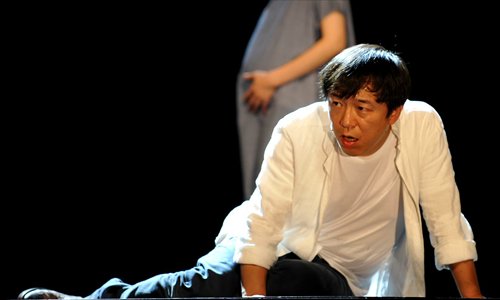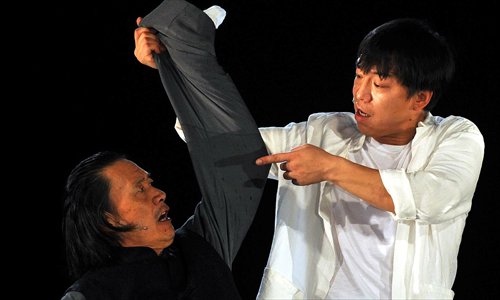Theatre of dreams
By Lu Qianwen Source:Global Times Published: 2014-2-10 20:58:01

To Live premiered in Chongqing in August, 2013. Photo: CFP

To Live premiered in Chongqing in August, 2013. Photo: CFP
When Chinese stage play director Meng Jinghui first went to Germany to watch Waiting for Godot 20 years ago, he promised himself that one day his work would be staged in that country. Now this February his work To Live (2013), adapted from Chinese writer Yu Hua's eponymous novel, has been invited to be performed at the hundred-year-old Deutsches Theater in Berlin and the Thalia Theater in Hamburger, after its 32 performances in China last year.Meng's To Live will also be performed at the Lessing Festival scheduled to open later this month. The past 20 years has taken Meng from a virtual unknown to a big-name theatre director in China, while stage art in the country has also grown since its introduction over 100 years ago.
Popularity spreads abroad
On February 3 when To Live premiered in Germany at the packed Thalia Theater, the audience, some of whom may have been familiar with the highly acclaimed original novel or the 1994 film version directed by Zhang Yimou, were reduced to both tears and laughter. The star cast, including Huang Bo and Yuan Quan, brought a 20th century Chinese family drama to life, with the story spanning 30 years from the civil war in the 1940s until the end of the Cultural Revolution in 1976.
While To Live is popular in Germany, another Chinese play A Dream Like A Dream (2013) by Taiwan director Stan Lai is being staged at the Esplanade Theatre in Singapore. Both top-tier directors in China, Meng and Lai are now seeing their popularity rise quickly overseas, with tickets for the two plays selling out a month before their respective opening nights.
"Chinese dramas like To Live, which showcased local people's lives in contemporary or current societies, have been very well received by foreign audiences over the past two years," said Fu Weibo, manager of the Oriental Pioneer Theater in Beijing.
For a long time, despite increasing exposure at different international drama festivals, Chinese stage plays had not been very popular abroad, just like the country's many other artistic forms such as films and fashion design. However, in the past several years the rise of several original dramas has caught many people's attention.
"In addition to To Live, Cooking A Dream (2011) by Huang Ying and Aquatique (2012) by Zhao Miao have become known by mainstream foreign drama audiences over the last two years," Fu told the Global Times.
Successful new play
In 2013 a small-budget drama The Face of Chiang Kai-shek, produced by students from the School of Liberal Arts of the Nanjing University, became the hottest new play in China. Originally made for the university's 110th anniversary, the play unexpectedly turned into a big hit with audiences.
With an investment of only 50,000 yuan ($8,245), The Face of Chiang Kai-shek not only crossed the boundary of the university campus, but successfully opened in foreign theaters, collecting tens of millions in revenue at theatre box offices. Between November and December last year it toured the US, being performed in seven cities including San Francisco, Los Angeles and New York.
"Drawing its structure from the highly influential drama Copenhagen (1998) by Michael Frayn, The Face is also a reflection of contemporary Chinese people's thoughts and views on historic events and figures," Fu analyzed. "That's why it has been so appealing to foreign audiences."
With limited choices of performances under the central government's drive for frugality, audiences are partly driven to watch dramas in theaters, according to Tian Qinxin, a renowned domestic director with representative works including The Beauty (2012) and Green Snake (2013).
"The low price of stage dramas is also an advantage," Fu added.
Market in full swing
Despite a 20 percent decline in the overall performing arts industry in 2013, domestic stage dramas saw a 10-percent-growth in revenue, with the booming market being attributed to emerging experimental theaters and various increasingly influential drama festivals across the country.
Beijing is the dominant drama center in the country, and in 2012 16 small and experimental theaters formed the Beijing Experimental Theater Alliance, with all of the members being privately run. By the end of last year the number of its members had ballooned to more than 50.
In 2013 there were more than 5,000 performances staged at these experimental theaters. Although not as popular as plays produced by large theaters such as the National Theatre of China and the Beijing People's Art Theatre, small and experimental theaters play an essential role in contributing to the burgeoning development of original stage plays.
Alongside the strong momentum of these experimental theaters, a series of drama festivals are attracting attention across the country. Last year, the first Wuzhen Theatre Festival was opened in Wuzhen, a renowned scenic spot in southern Zhejiang Province. The festival stimulated interest both at home and abroad due to its heavyweight organizers, which include Meng Jinghui, Stan Lai and TV star Huang Lei.
There are several other festivals, especially in Beijing. The Nanluoguoxiang Performance Festival, launched in 2010 by Wang Xiang, the owner of the experimental Penghao Theatre, has developed over the past few years, with the government of Dongcheng district (Nanluoguxiang is a famous hutong located in Dongcheng district in Beijing) also joining in last year. The earliest and most noted Beijing Fringe Festival, also led by Meng Jinghui, this year entered its 7th year.
Still relatively unfamiliar to Chinese audiences, stage drama can't survive independently in China without the support of the government. "Government support will form a steady mechanism under the guidance of the central government's stress on developing the cultural industries," said Fu.
Despite offering much needed financial aid to experimental theaters, supervision from the government can also be an issue. In August last year the Beijing government publicly issued a statement recruiting volunteers to supervise the performances in experimental theaters. It stated that volunteers must report on any outstanding plays, as well as those negative ones involving situations which are detrimental to national unity or that could disrupt social harmony.
"Discipline is necessary in creating stage art, no matter in which country," said Fu. However, local government still need to be very cautious in this regard, since the art of drama is still young and growing in China, and too many restrictions could easily stifle it.
Posted in: Theater